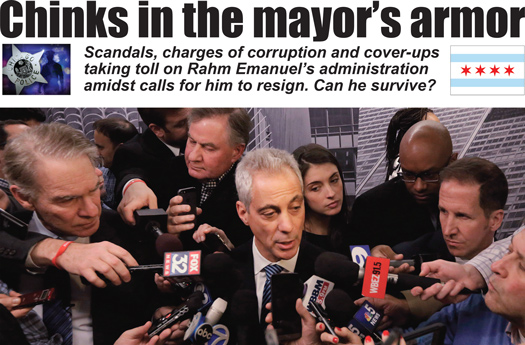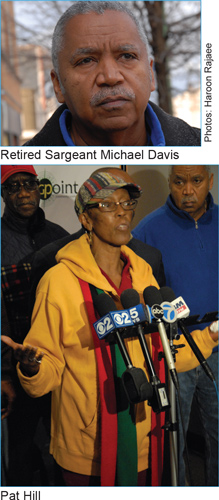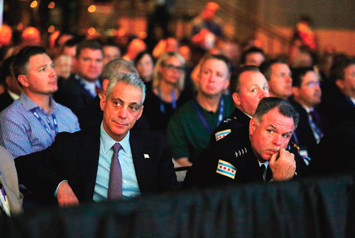A year of anger, activism and action
By Starla Muhammad and Charlene Muhammad -Final Call Staffers- | Last updated: Dec 29, 2015 - 3:19:55 PMPrinter Friendly Page
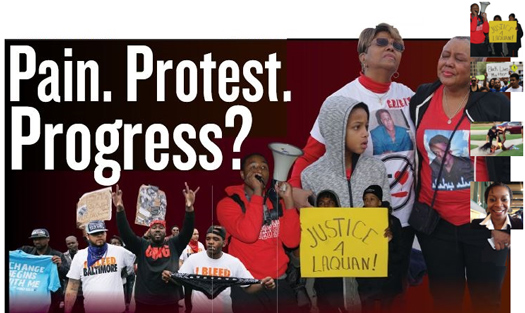 |
The Final Call examines what 2015 meant for Black America and what new year may bring
After a year of young people leading angry street protests in response to disturbing deaths of Blacks in police custody and mistreatment of Blacks by law enforcement and the courts, 2016 will likely bring more resistance as activists vow to continue battling social and economic injustice and racism.
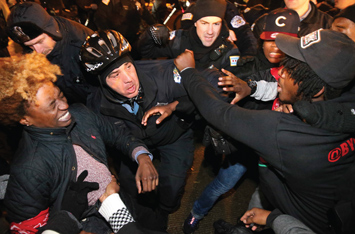 |
In unemployment, housing, education, wealth and health, Blacks continued languishing behind Whites. Increased racial tension and White backlash manifested itself through targeted opposition to the #BlackLivesMatter movement, roadblocks to voter registration, discrimination on college campuses and violence, including the slaughter of nine Black parishioners at Mother Emmanuel AME Church in Charleston, S.C. by a White gunman.
Dylann Storm Roof, the suspected gunman, ascribed to Neo-Nazi and White Supremacist ideals and was charged with murder for the June 17 massacre. His trial on nine murder counts among other charges is slated for July 2016. He was also charged with federal hate crimes.
Seemingly every week videos of police killing or abusing Black men and women made headlines. Sandra Bland, Laquan McDonald, Mario Woods and Freddie Gray joined almost countless others who died at the hands of police or while in police custody. Their deaths not only brought to light the abuse and injustices by law enforcement that Black communities have cried out about for decades, but these cases fueled activists who demanded justice for victims of what many labeled “state sanctioned violence.”
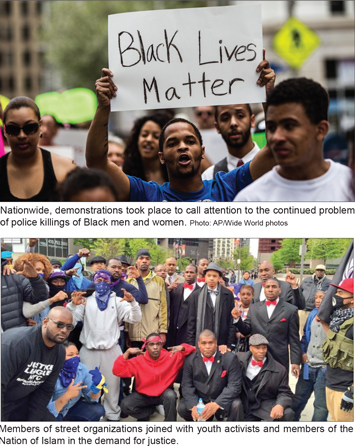 |
- Forty-one of the 60 police departments disproportionately killed Black people relative to the population of Black people in their jurisdiction. Fourteen police departments killed Black people exclusively in 2015, 100 percent of the people they killed were Black. For only five police departments were 100 percent of those killed White,” according to a Mapping Police Violence report on police killings in 2015.
Police killed at least 1,152 people in the United States from January 1-December 15, 2015, said the report.
“Nearly one in four of these people was killed by one of America’s largest 60 city police departments. Fifty-nine of the nation’s largest 60 city police departments killed civilians in 2015. Some killed at much higher rates than others: Bakersfield, Oklahoma City, Oakland, Indianapolis Metropolitan, Long Beach, New Orleans, St. Louis Metropolitan, and San Francisco Police Departments killed people at the highest rates in 2015.”
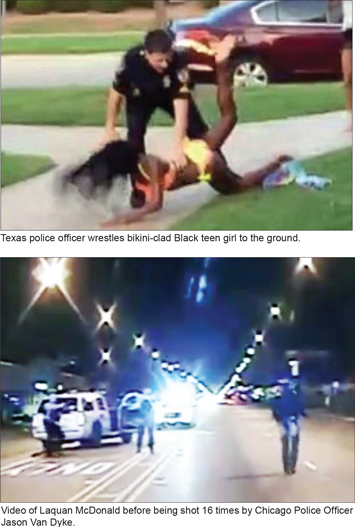 |
“While some have blamed violent crime for being responsible for police violence in some communities, data shows that high levels of violent crime in cities did not appear to make it any more or less likely for police departments to kill people,” the report found. “Rather than being determined by crime rates, police violence reflects a lack of accountability in the culture, policies, and practices of the institutions of policing, as investigations into some of the most violent police departments in America have shown.”
Resistance, rebellion and results
“With state-sanctioned violence, there are a few things going on. In many ways I think it’s connected to the inter-communal violence. I think we left open three critical areas to really start planting seeds,” said Davey D, a hip hop journalist, historian, talk show host and activist.First there’s the problem of media, which affects the community inside and out, he continued. “We give too much of the past to too many people who have used our dehumanization for profit” and that dehumanization comes in many forms, he said. Some is overt, he said, but much is very subtle.
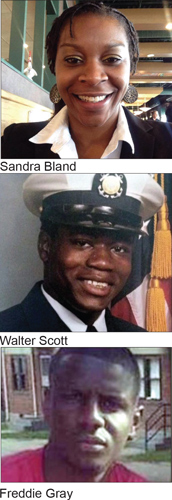 |
“Like we did with Obama, we didn’t demand a certain amount of standards that needed to be put forth because our endorsement of their success was really dependent upon the expectation that they would humanize us and they didn’t in the long run. So that fielded a compromise in a big way and the end result was and the end result has been we are not empowered,” he said.
But this year, youth, particularly Black and Brown youth, refused to remain silent and sit on the sidelines in the face of oppression.
Nationwide demonstrations and protests against police brutality and White Supremacy culminated in October when according to some estimates 800,000 to 1.5 million people gathered in Washington, D.C. for Justice Or Else!, a commemoration of the 20th anniversary of the Million Man March. The Oct. 10 gathering, convened by Nation of Islam Minister Louis Farrakhan, gave a platform to Black, Indigenous and Brown communities and other aggrieved groups who presented their cases and demands before the world in a continued fight for true freedom, justice and equality. There was also a call for Black communities to stop the fratricidal violence that plagues many urban areas.
“It’s hypocritical for us to say that we are ‘citizens’ and we are still trying to get civil rights, while at the same time we are denied the human right of self-determination. I’m honored to be here in front of this great, great house that was built by Black slaves. So I don’t think I’m encroaching on any American by standing on the ground that was paid for with the sweat and the blood of our ancestors,” Min. Farrakhan told the massive crowd from a stage on the steps of the U.S. Capitol.
“There can be no freedom, no justice, no equity without the willingness of some to sacrifice for the rest. What good is life if we are not free? What good is it to be alive and every day that you live you see your people suffering? What good is it to be—continue in life under tyranny? So there must come a time when we say, ‘Enough is enough.’ It must change—and I am willing to do whatever it takes to bring about that change,” said Min. Farrakhan.
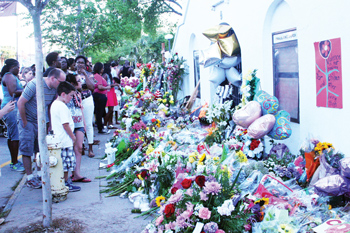
A memorial in front of Mother Emmanuel AME Church in Charleston, S.C. where nine Black parishioners were shot to death by a White gunman June 17, 2014. Photo: Andrea Muhammad
|
“When I leave you today, the calamities are going to get stronger, because God wants America to let us go. Not integrate us—let us go, and give us a good sendoff. Those of you who are scripturally sound: Moses was not an ‘integrationist,’ and neither are we. Let me be clear: America has no future for you or for me. She can’t make a future for herself, much less a future for us. The scripture says, ‘Come out of her, My people’—and we’re going to have to come out. God says he takes the kingdom from whom he pleases, and he gives it to whom he pleases,” said Min. Farrakhan.
“It’s clear that this year was a year of rebellion and resistance as it relates to police brutality and misconduct and killing of Black men and women in American society,” said Dr. Ron Daniels, president of Institute of the Black World. In places like Ferguson, Mo., New York, Chicago and Baltimore, the outspokenness and action of youth was evident, he explained.
“The incredible response by young African American men and women on the street in resistance there and of course the explosive and positive growth of the Black Lives Matter movement which has become sort of the mantra of this new generation,” said Dr. Daniels.
“What you saw is an incredible amount of resistance from Black people. Very strong, very creative, very innovative and I think intensifying and growing during the course of the year.”
Jonathan Butler, a student leader and activist escalated that intensity when he stopped eating on Nov. 2 to force the resignation of Tim Wolfe, University of Missouri president, who failed to address students’ concerns about campus discrimination and take meaningful action.
Black students had been complaining for years, to no avail. His hunger strike lasted seven days.
After the university’s football team and coach backed the graduate student’s demand and refused to play until Mr. Wolfe vacated his post, he and school chancellor R. Bowen Loftin resigned.
“I think it’s pushing us in the direction we need to go. Total dissatisfaction, total mistrust, no belief in this system,” said Faheem Muhammad, an activist and co-founder of Black Buycott. He said the system isn’t broken, but it’s rotten to the core and works perfectly as it was designed, which is to break Black people particularly and the oppressed of the world. Part of the problem is some Blacks have the notion that the Democratic Party, or anyone else will help them, he explained.
“It’s not that Obama didn’t want to do something for us or desire to do something for us, but this system is filthy. It’s wicked, and it’s corrupt, so he can’t do anything for us,” said Mr. Muhammad.
Dissatisfaction with the status quo gave rise to action. In solidarity with demonstrators in Ferguson and nationwide protests in honor of Michael Brown, Jr., the Blackout Collective shut down the Bay Area Rapid Transit in West Oakland on “Blackout Black Friday.” In Chicago, thousands took to the streets the same day in response to the death of 17-year-old Laquan McDonald who was shot and killed by Chicago Police Officer Jason Van Dyke in October last year. Video of the encounter was not made public until November 2015 and only after a judge ordered its release. Soon after the teens death the city quickly paid a $5 million settlement to the family. Allegations of a conspiracy and cover-up quickly ignited protests in a city whose sordid police history is well documented. In response, demonstrators shut down the Magnificent Mile, on Black Friday, causing retailers to lose millions of dollars.
Retailers, who count on November and December holiday sales to boost their financial coffers, took a hit in 2015 as sales spiraled downward. According to a mid-December article on Forbes.com, post-Thanksgiving days have been terrible for most retailers in 2015.
According to the National Retail Federation, this year’s holiday sales are “slower than expected.”
While some analysts attribute the decline to fewer dollars coming in due to lower prices, it’s clear that this year has been a relative bust for the collective retail establishment.
“If our Black lives don’t matter, then neither should our Black dollars,” said Minister Farrakhan.
Politics, economics and White fear
During his year end Dec. 18 press conference, President Barack Obama told reporters steady, persistent work over the past few years is “paying off for the American people in big, tangible ways.” He touted unemployment falling to five percent and growing wages as examples of progress.
But for many Blacks on the economic front, 2015 continued to remain relatively stagnant.
According to mid-December data released by the Economic Policy Institute, the unemployment rate for Blacks was still on average twice that of Whites, regardless of educational achievement. From December 2014 through November 2015 the unemployment rate for Black college graduates was 4.1 percent compared to 2.4 percent for Whites. The disparity between those with less than a high school diploma was even more telling, with Blacks having an unemployment rate of 16.6 percent compared to 6.9 percent for Whites.
According to the EPI data, “persistent disparities in unemployment are constant reminders of how race continues to have an undue influence on life in this country.”
The optimism many people, especially Black Americans had when Mr. Obama first took office has waned. When asked what changes or expectations folks can expect during the president’s last year in office, economist Dr. Julianne Malveaux was blunt.
“I think we should expect pretty much what we’ve been getting and again, people will have mixed feelings and ambivalence about this president and his legacy. His legacy is that he’s the first Black president, his legacy is that he did healthcare,” said Dr. Malveaux referring to the Affordable Care Act.
“I’m not so sure what else I would consider a part of his legacy. Again I would ask questions, has the material conditions of Black people in particular changed? And unfortunately the answer would have to be pretty much no,” she continued.
“Now he did get us out of the recession and that means that everybody is better off. But have any of the gaps, the wealth gaps, income gaps, the unemployment gaps, have they narrowed? And the answer is no,” said Dr. Malveaux. However, it must be pointed out, she explained, that Mr. Obama had to deal with a very hostile Congress vehemently opposed to everything he tried to accomplish.
As he heads into his final year as president, Mr. Obama could utilize his power of Executive Order to help Black people, the noted author and president emerita of Bennett College for Women told The Final Call. It could be used to set up an investigative arm to examine and study the issue of reparations for Black descendants of slaves as laid out by H.R. 40 introduced by Rep. John Conyers (D-Mich.) in 1997. It has never made it out of committee with some members of the Congressional Black Caucus even not supporting it.
“This president has the opportunity to do something. It’s mild but it might get us started in a direction of a conversation that we need to have about wealth gaps. I don’t expect that to happen, but what I have seen in this last year, there have been flashes of boldness from the president that we had not seen before,” she said.
But as Mr. Obama’s term winds down, the message of Republican presidential candidate Donald Trump has resonated with many White voters who feel their place at the top is being usurped. His racially coded language has not stopped thousands of mostly Whites who fill venues to hear his message.
“There is a fear that White people are being left behind, and soon will be vanquished, or put into the third or fourth sphere where they have been used for the past few hundred years of running the world,” said Khari Enaharo, author of “Race Code War, The Power of Words, Images And Symbols on The Black Psyche.”
The widespread violence at the hands of police is like a clarion call to White race warriors, he added. “All police are not White Supremacists, but there are White Supremacists who will disguise themselves as police, and they will engage in racial injustice,” Mr. Enaharo told The Final Call. The clarion call sounds like, “Let’s take our country back,” “We’ve got to stop these savages, we got to stop these monsters,” and politicians are stoking that fear, he said.
“What they have done is created a whole industry where they have criminalized through racial codes, symbols through racial code words, through racial coded images. They have criminalized a whole race of people,” he added.
The killings have purposefully shifted people’s focus from thousands of things they should but don’t pay any attention to, Mr. Enaharo said.
“That means we don’t have to deal with HIV-AIDS anymore. We don’t have health problems. We don’t have an economic problem. … That is by design to get our attention off of the things that are being done to us and we are not paying attention to this war, this racial war that is being waged in education, economics, sex and sports. Everywhere we look we are being racially wiped out and we aren’t paying attention to it,” said the author.
Several efforts aimed at self-determination and action, including “Buy Black” campaigns, calls to support Latino, Native American and Indigenous businesses and withholding dollars from huge multi-billion dollar corporations took root this year in response to injustices and a call to redistribute the pain.
Cecile Johnson, CEO and founder of the African Development Plan, a solutions-oriented collaborative that looks at the needs of Black communities on a local, national and international level, said this year marked an increased awareness globally on what Black Americans have been faced with hundreds of years.
For the first time, said Ms. Johnson, there seems to be more willingness by Black people to work across religious and ideological lines and build coalitions. The elders are helping behind the scenes but an intergenerational healing and atonement needs to take place and youth must continue moving forward, said Ms. Johnson, who holds a master’s degree in Inner City Studies Education. Black people have a right to self-determination and human rights which includes the right to education, culture and life, she said.
Moving forward Black people can continue doing things to invest in their collective future, including harnessing $1.2 trillion in spending power they have, she said.
“There’s things that we can do, churches, mosques, synagogues that are all Black, put your money in a Black bank. That only takes 15 minutes and now you’re beginning to invest in us, that’s one step,” said Ms. Johnson. Black faith-based institutions must be actively engaged and working in the community by investing in businesses, establishing mentoring programs and other services, she continued.
“I see a political climate and us pushing a Black agenda, pushing political empowerment, pushing self-determination as a way to begin waking Black people up. So I see 2016 as a year that people are going to have to get woke up,” said Ms. Johnson.
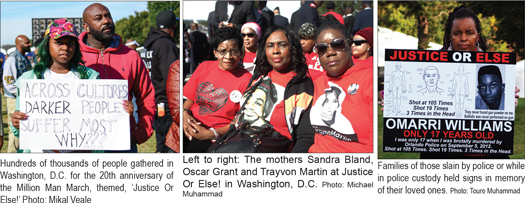 |
Politics, economics and White fear
During his year end Dec. 18 press conference, President Barack Obama told reporters steady, persistent work over the past few years is “paying off for the American people in big, tangible ways.” He touted unemployment falling to five percent and growing wages as examples of progress.
But for many Blacks on the economic front, 2015 continued to remain relatively stagnant.
According to mid-December data released by the Economic Policy Institute, the unemployment rate for Blacks was still on average twice that of Whites, regardless of educational achievement. From December 2014 through November 2015 the unemployment rate for Black college graduates was 4.1 percent compared to 2.4 percent for Whites. The disparity between those with less than a high school diploma was even more telling, with Blacks having an unemployment rate of 16.6 percent compared to 6.9 percent for Whites.
According to the EPI data, “persistent disparities in unemployment are constant reminders of how race continues to have an undue influence on life in this country.”
The optimism many people, especially Black Americans had when Mr. Obama first took office has waned. When asked what changes or expectations folks can expect during the president’s last year in office, economist Dr. Julianne Malveaux was blunt.
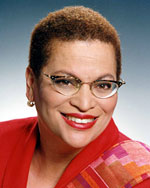
Dr. Julianne Malveaux
|
“I’m not so sure what else I would consider a part of his legacy. Again I would ask questions, has the material conditions of Black people in particular changed? And unfortunately the answer would have to be pretty much no,” she continued.
“Now he did get us out of the recession and that means that everybody is better off. But have any of the gaps, the wealth gaps, income gaps, the unemployment gaps, have they narrowed? And the answer is no,” said Dr. Malveaux. However, it must be pointed out, she explained, that Mr. Obama had to deal with a very hostile Congress vehemently opposed to everything he tried to accomplish.
As he heads into his final year as president, Mr. Obama could utilize his power of Executive Order to help Black people, the noted author and president emerita of Bennett College for Women told The Final Call. It could be used to set up an investigative arm to examine and study the issue of reparations for Black descendants of slaves as laid out by H.R. 40 introduced by Rep. John Conyers (D-Mich.) in 1997. It has never made it out of committee with some members of the Congressional Black Caucus even not supporting it.
“This president has the opportunity to do something. It’s mild but it might get us started in a direction of a conversation that we need to have about wealth gaps. I don’t expect that to happen, but what I have seen in this last year, there have been flashes of boldness from the president that we had not seen before,” she said.
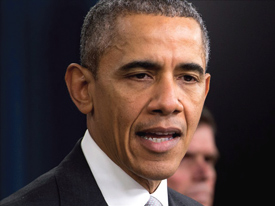
President Barack Obama
|
But as Mr. Obama’s term winds down, the message of Republican presidential candidate Donald Trump has resonated with many White voters who feel their place at the top is being usurped. His racially coded language has not stopped thousands of mostly Whites who fill venues to hear his message.
“There is a fear that White people are being left behind, and soon will be vanquished, or put into the third or fourth sphere where they have been used for the past few hundred years of running the world,” said Khari Enaharo, author of “Race Code War, The Power of Words, Images And Symbols on The Black Psyche.”
The widespread violence at the hands of police is like a clarion call to White race warriors, he added. “All police are not White Supremacists, but there are White Supremacists who will disguise themselves as police, and they will engage in racial injustice,” Mr. Enaharo told The Final Call. The clarion call sounds like, “Let’s take our country back,” “We’ve got to stop these savages, we got to stop these monsters,” and politicians are stoking that fear, he said.
“What they have done is created a whole industry where they have criminalized through racial codes, symbols through racial code words, through racial coded images. They have criminalized a whole race of people,” he added.
The killings have purposefully shifted people’s focus from thousands of things they should but don’t pay any attention to, Mr. Enaharo said.
“That means we don’t have to deal with HIV-AIDS anymore. We don’t have health problems. We don’t have an economic problem. … That is by design to get our attention off of the things that are being done to us and we are not paying attention to this war, this racial war that is being waged in education, economics, sex and sports. Everywhere we look we are being racially wiped out and we aren’t paying attention to it,” said the author.
Several efforts aimed at self-determination and action, including “Buy Black” campaigns, calls to support Latino, Native American and Indigenous businesses and withholding dollars from huge multi-billion dollar corporations took root this year in response to injustices and a call to redistribute the pain.
Cecile Johnson, CEO and founder of the African Development Plan, a solutions-oriented collaborative that looks at the needs of Black communities on a local, national and international level, said this year marked an increased awareness globally on what Black Americans have been faced with hundreds of years.
For the first time, said Ms. Johnson, there seems to be more willingness by Black people to work across religious and ideological lines and build coalitions. The elders are helping behind the scenes but an intergenerational healing and atonement needs to take place and youth must continue moving forward, said Ms. Johnson, who holds a master’s degree in Inner City Studies Education. Black people have a right to self-determination and human rights which includes the right to education, culture and life, she said.
Moving forward Black people can continue doing things to invest in their collective future, including harnessing $1.2 trillion in spending power they have, she said.
“There’s things that we can do, churches, mosques, synagogues that are all Black, put your money in a Black bank. That only takes 15 minutes and now you’re beginning to invest in us, that’s one step,” said Ms. Johnson. Black faith-based institutions must be actively engaged and working in the community by investing in businesses, establishing mentoring programs and other services, she continued.
“I see a political climate and us pushing a Black agenda, pushing political empowerment, pushing self-determination as a way to begin waking Black people up. So I see 2016 as a year that people are going to have to get woke up,” said Ms. Johnson.
